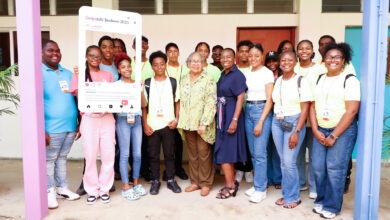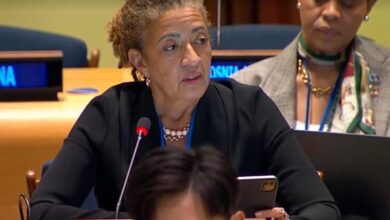Our youth have fresh perspectives, the energy and the willingness to learn and all that is needed to unlock their potential, is the chance to do so, from the people who have the power to provide opportunities.
We need to highlight all professions, and showcase their importance to the development of the region, rather than tell our youth that in order to be successful you need to sit in an office or be a lawyer or doctor.A precise description of the job market is needed, which provides an accurate snapshot of the areas that are over saturated as well as the areas that could benefit from additional stimulation. The services sector should work alongside our research institutions to provide this information, so that we can encourage persons to seek careers that suit the job market, rather than have a job market that doesn’t support the people.
Dean, CARICOM Youth Ambassador, at Opening of Regional Symposium on Services Sector, 17-19 October, Antigua and Barbuda
Read full address:
It gives me great pleasure to be able to address such a distinguished and diverse group of the regions leaders, within the services sector, on behalf of the youth who have an invested interest in the outcome of these proceedings.
The services sector, which covers more than 70% of the region’s export earnings, offers wide and varied opportunities for youth to play a part in the development of their nations, and therefore, it allows them to play a part in the development of the region.
As with many, dare I say all, of the economic sectors, our youth are an underutilized resource, that when tapped, can only enhance the growth of this division which encompasses retail, distribution, consultancy, financial, tourism, communication, transport and more.
In 2015, the International Labour Organization stated that the effects of the economic down turn were still being felt and predicted that unemployment in the Caribbean would increase by 6.9 % in 2016. This is worrisome, as the region has over 60% of its population under the age of 30. This means more than half of the population falls within the bracket of new job seekers.
This is despite our excellent universities in the Caribbean producing thousands of qualified graduates yearly. These graduates vie for the shrinking pool of jobs, caused by the economic difficulties and the advances in technology.
If our youth are the key to a sustainable future, then we need to engage them. Their value must not be overlooked.
Yet we inadvertently do so, when vacancies are advertised and they require a minimum of three years’ experience. Or after a few weeks of a vacancy being posted, a notice is found in the paper stating that since no suitable candidate has been found, we are tendering for applicants outside of the country.
Our youth are feeling as though their life is a catch 22. We constantly advise them to go forth and seek education, so they take out loans, dedicate a minimum of four years to their pursuit of higher learning and leave with the idea that the hard work will pay off.
The job hunting process has gotten simultaneously easier and harder. On one hand, the days of the hand written application are behind us and email makes it possible to send out 30 applications a day. Yet the uncertainty of whether it has arrived at its intended target or was even seen due to the sheer amount of applications human resources managers undoubtedly received can make the waiting process difficult.
The services sector may be the solution of unravelling this catch 22.
As one of the most diverse sectors, the idea of implementing internships on a large scale must be considered. This is one answer to curbing the epidemic of youth who leave secondary or tertiary schools without any practical experience.
Internships are beneficial to all involved. The youth gain invaluable experience by training within a real working environment, while businesses can benefit from the added manpower, low rate labor and increased productivity.
In doing this, you might also be able to find future qualified employees who fit the image and culture of your organization.
Our youth have fresh perspectives, the energy and the willingness to learn and all that is needed to unlock their potential, is the chance to do so, from the people who have the power to provide opportunities.
We need to highlight all professions, and showcase their importance to the development of the region, rather than tell our youth that in order to be successful you need to sit in an office or be a lawyer or doctor.
A precise description of the job market is needed, which provides an accurate snapshot of the areas that are over saturated as well as the areas that could benefit from additional stimulation. The services sector should work alongside our research institutions to provide this information, so that we can encourage persons to seek careers that suit the job market, rather than have a job market that doesn’t support the people.
Organizations and entities such as yours, need to have a hand in building our youth. Your contribution ensures the sustainability of our region.
If youth feel as though opportunities are available to them within their own backyard, they will not go beyond our shores to seek them out. This is one resource we cannot afford to lose to foreign investors.
As the leaders within your sector, you have a duty to yourselves and to our region to draw upon every available avenue to ensure profitability and longevity of your investments. Our people depend upon you. Your decisions affect the outcome of the future.
I encourage you to let the skills of the youth play a part within your decision making. As you plan for your future, consider the ways youth fit into your strategies.
Ban Ki Moon, Secretary General of the United Nations once said that a plan without including or considering youth is a plan without sustainability. So we need answer this question- will our talks here lead to action with sustainability?





